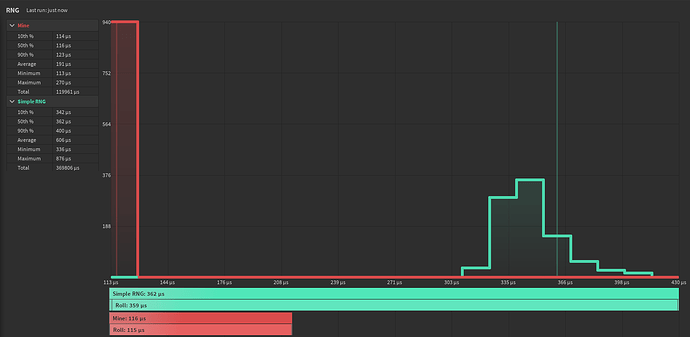RNG Module
The RNG module provides a utility to generate weighted random selections based on specified rarity percentages. This module is designed for use in Luau (Roblox’s Lua dialect) and can be particularly useful in games or systems where probability-based outcomes are required, such as loot tables, random events, or gacha mechanics.
Install: GitHub | Studio Model
Features
- Rarity-Based Probability: Define multiple
- High Precision: Su
-
Efficient Lookups: Uses
NumberRangeto map percentages to rarity items for fast retrieval.
API Documentation
Types
RarityPercents
A list of rarities and their associated probabilities.
export type RarityPercents = {
{ rarity: string, percent: number }
}
RandomItems
A dictionary mapping NumberRange objects to rarity strings.
export type RandomItems = {
[NumberRange]: string
}
Functions
RNG.new(rarityPercents: RarityPercents): RNG
Creates a new RNG object.
-
Parameters:
-
rarityPercents: A list of rarity strings and their corresponding percentages. The total of all percentages must equal100.
-
-
Returns:
- A new instance of the RNG object.
RNG:Roll(): string
Performs a random roll and returns a rarity based on the defined percentages.
-
Returns:
- A string representing the selected rarity.
Usage Example
local RNG = require(path.to.RNG)
local rarities = {
{ rarity = "Common", percent = 70 },
{ rarity = "Rare", percent = 29.99999999999 },
{ rarity = "Legendary", percent = 0.00000000001 },
}
local rng = RNG.new(rarities)
local result = rng:Roll()
print("You got:", result)
Internals
getDecimalPlaces(num: number): number
Calculates the number of decimal places in a given number.
isNumberInRange(num: number, numRange: NumberRange): boolean
Checks if a number is within a specified NumberRange.
_Initialize(rarityPercents: RarityPercents)
Initializes the RNG object by calculating the mapping of NumberRange to rarity strings based on percentages.
Notes
- The total percentage of all rarities must sum to exactly
100. If this condition is not met, the module will throw an assertion error. - Internally, the module handles decimal precision dynamically, so you can use fractional percentages like
33.3or66.7with confidence.
This module ensures a robust and flexible approach to probability-based randomization for your Roblox projects.
